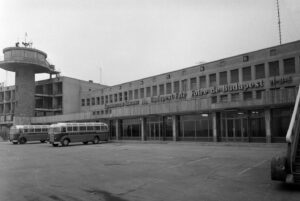
While GDP was positively affected by the combined performance of services, the economy's performance was held back by industry and construction.Continue reading

Liszt Ferenc International Airport welcomed its first passengers seventy-five years ago, on May 7, 1950. Since then, 302 million people have passed through its terminals, and Budapest Airport has earned significant recognition not only domestically, but also internationally.
The airport, which now serves nearly 60.000 passengers a day, did not handle this much traffic in its first year of operation. Now, however, it is on track to break all previous records in 2024, handling 17.6 million passengers and nearly 300,000 tons of cargo, according to Világgazdaság.

Ferihegy (today Liszt Ferenc) Airport, 1949
It is no coincidence that Budapest Airport has been ranked among the best airports in Europe twice, based on passenger reviews. According to Skytrax’s 2025 survey, it was also named the best in the region for the twelfth time in a row. Speaking of numbers, an average of 300 flights depart daily, connecting Budapest to a total of 142 international destinations.

Ferihegy (today Liszt Ferenc) Airport, 1966
In recent decades, the airport has played a prominent role not only in passenger traffic but also in air cargo handling. Thanks to BUD Cargo City, it has become one of the most important hubs in Central and Eastern Europe for imports and exports.

Ferihegy (today Liszt Ferenc) Airport, 1957
The airport’s name, Liszt Ferenc, provides another symbolic link to the anniversary: this year marks the 175th anniversary of one of the composer’s most famous works, Liebesträume. This work and Liszt’s travels inspired the year-long series of celebrations, which focuses on the intertwining of music, culture, and travel.
Via Világgazdaság; Featured photo: MTI/Koszticsák Szilárd